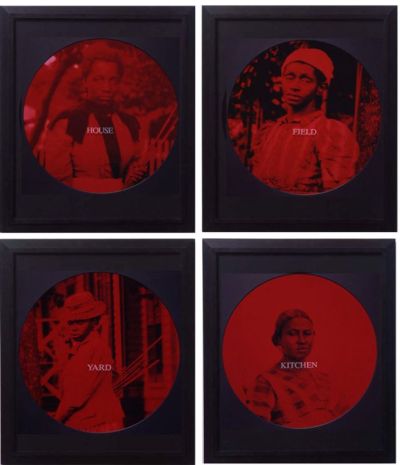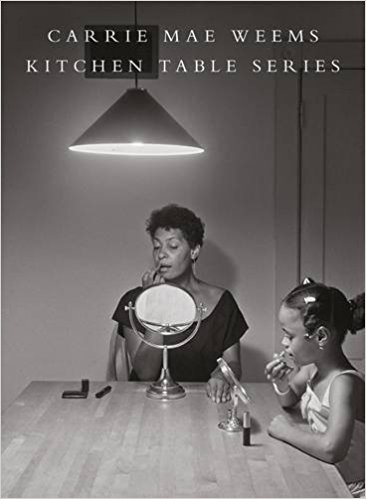“Even in the midst of the great social changes we’ve experienced just in the last year with the election of Barack Obama, for the most part African Americans and our lives remain invisible. Black people are to be turned away from, not turned toward—we bear the mark of Cain. It’s an aesthetic thing; blackness is an affront to the persistence of whiteness.”- Carrie Mae Weems, in conversation with Dawoud Bey for BOMB magazine, Summer 2009
(Images: “Woman and daughter with makeup” and “Three women sitting at a kitchen table,” courtesy Art Institute of Chicago)
Artist and photographer Carrie Mae Weems shows us what Billie and Phyllis sang about, a corner of life so cleverly recognizable to a Black female milieu dodging the lesser informed’s exotification as a caste, though much haughtier and more complex for this misinterpretation to be true.
Weems was a closed artistic circles’ and academic best-kept secret for what seemed like would be forever, until a series of high -profile awards and democratic social technologies carried her nervy, unnerving images to a critical mass. For the young woman I was who explored the humanities and African-American culture at University of Chicago, it was only natural I would encounter her work in professors’ talks on the scant Black female “artiste” whose body of work had persisted or arisen to value and attention in the past or by turn of the century. Her work did not pander, and was clearly a force inside born to propose a bohemian viewpoint and provocative perspective on ordinary Black Americana and Black female existence.

When Weems received a 2013 MacArthur Genius Grant and a solo exhibit of her work opened at the Guggenheim in New York City in 2014, she was in her sixties. She has not had an orthodox career. Born in Portland, Oregon, in 1943 and a mother by age 16, she received her B.A. from Cal Arts at age 28 and took her first photography class in her 30s. This charming, organic roundabout to the career she has become famous for is symbolic of her work: natural, unassuming and pure moment-in-time verisimilitude among men and women, women and children, and women and the world. Although her seminal work sprouted amidst the Black nationalist and Pan-African renaissance of the 1970s, when to be black meant to be natural and Kente-clad for those most serious about it, Weems centered her work upon the trodden or casual scenes probably most average of Black life.
She is most known for her Kitchen Table series, a spare and familiar but rich and haunting peek through the turnstile of conversations, moments, decisions, memories, disagreements and resolutions centered around arguably the most important and essential piece of furniture in most homes. Weems is a frequent subject in her own work, often the only reminder we see art and not actual family or love affair photographs. Otherwise the touching narratives she contrives for our eyes would feel uncomfortable to look at, too close to a domestic peep show into how Black Americans relax alone and together when doors close to White America for the nights.
Contemporary Negressive visual artists Deana Lawson and Rachel Eliza Griffiths share similar drives toward common beauty and unflinching sight as Weems captures in her story pictures: the symbioses of Black domestic life and the mysterious unipower of the Black female psyche unleashed from it. Many more have Weems to thank for this.
CARRIE ONLINE




Thank you Kalisha for this post on Weems. I’ve admired her work for years.
LikeLiked by 1 person
Thank you Giana…I have loved yours for going on years now as well. I will be collecting again soon and also hope we can work together at some point. Many blessings, Kalisha
LikeLike